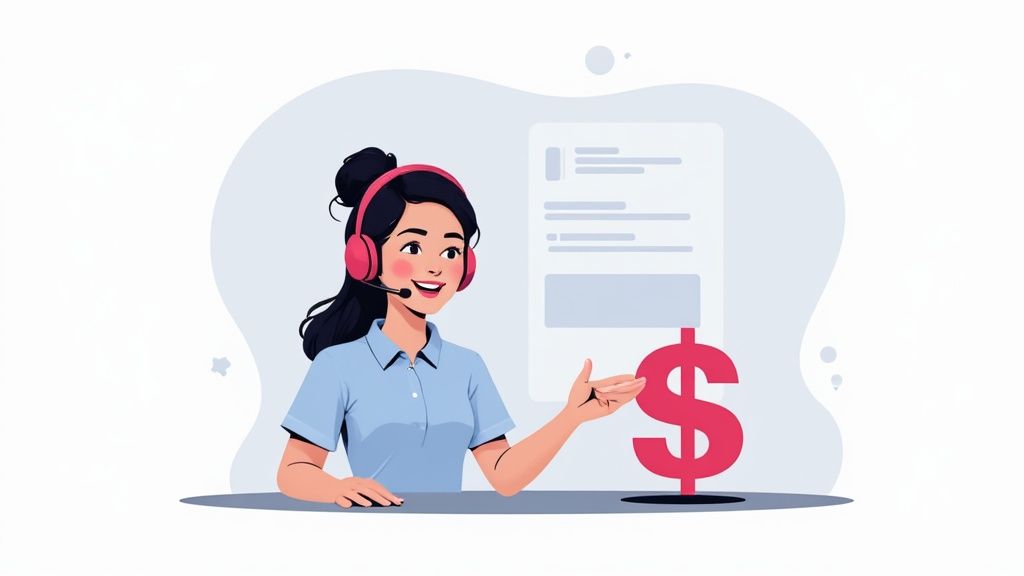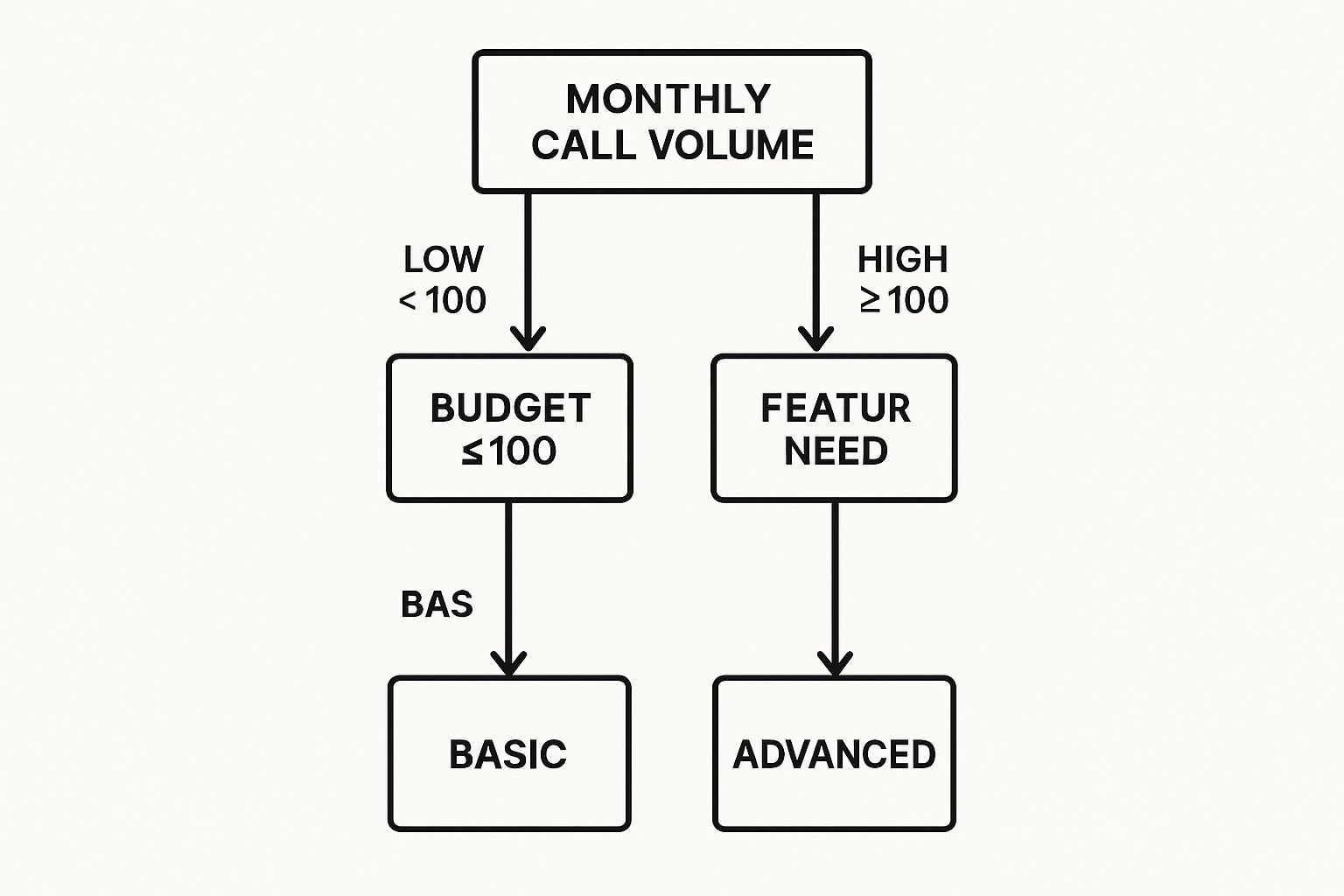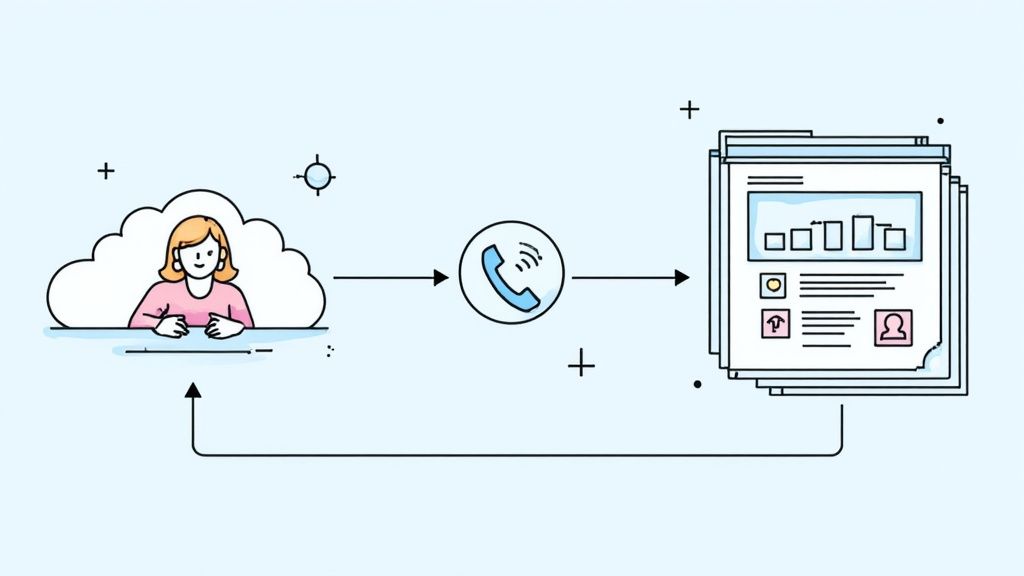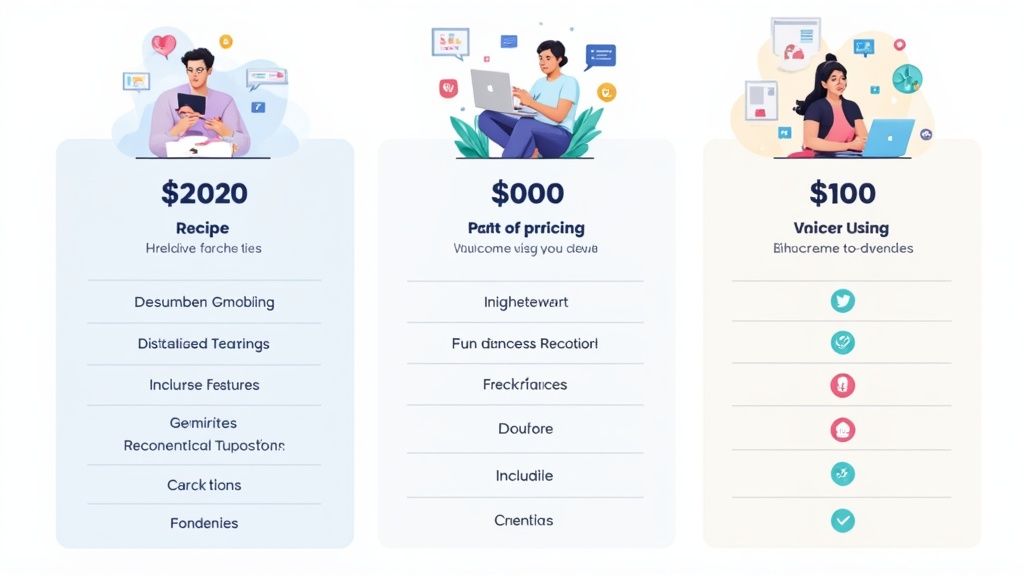An inexpensive answering service isn't about being cheap; it's about being smart. It gives you a professional, live person answering your calls 24/7 without the massive overhead of hiring someone in-house. For a one-person shop, it means every call gets answered, leads get captured, and customers feel taken care of.
Why Smart Businesses Invest in Answering Services

That call you miss while you're on a ladder or under a sink? It's not just a minor annoyance. It's revenue walking straight over to your competitor. For small service businesses, being unavailable is one of the fastest ways to lose a customer who needs help right now. This is where the real value of an answering service clicks into place.
It's about more than just having someone pick up the phone. It's a strategic move to project a stable, professional image. When a potential client calls and a friendly, competent agent answers—any time, day or night—it builds immediate trust. They don't know you're a solo operator in a truck; they just know their problem was handled professionally from the get-go.
The Real Cost of a Missed Call
Every unanswered ring costs you more than just that one job. It chips away at your reputation for being responsive, which is gold in any service-based industry. A good, affordable answering service flips this vulnerability into a strength. It's an investment that pays for itself by:
- Capturing every single lead: No more losing a job to voicemail. Ever.
- Keeping existing clients happy: Customers feel valued when they know they can always reach a real person.
- Punching above your weight: You instantly appear larger and more established than you might actually be.
The market for these services is huge for a reason. In fact, the US answering services industry recently hit $2.5 billion in revenue, which just proves that businesses still see the immense value in human interaction over purely automated systems.
An inexpensive answering service isn’t about finding the absolute rock-bottom price. It’s about making the smartest, most cost-effective investment in your customer experience and, ultimately, your bottom line.
For a deeper dive, check out our full guide on how a call answering service for small businesses can be a game-changer for growth and landing more clients.
How to Decode Answering Service Pricing
Figuring out the pricing for an answering service can feel like you're trying to solve a puzzle. To find a genuinely affordable option, you have to look beyond the flashy headline price and really get a feel for how the different models will play out with your company’s real-world call patterns.
The whole point is to pay for what you actually use, not what a sales rep thinks you need.
You'll almost always run into three common pricing setups: pay-per-minute, pay-per-call, and flat-rate monthly plans. Each one has its own quirks, benefits, and potential traps, depending entirely on how many calls you get and how long they usually last.
Per-Minute vs. Per-Call Models
A pay-per-minute plan is often the most straightforward and budget-friendly choice, especially if your call volume goes up and down. You get billed for the exact time an agent spends on your calls—from "hello" to "goodbye." This works beautifully for businesses that need longer, more detailed conversations, like a law firm handling initial client intake calls.
On the flip side, a pay-per-call plan hits you with a set fee for every single call they answer, no matter how short it is. This can be a disaster for a business like an HVAC company that gets swamped with quick, 30-second calls for quotes or scheduling. Those short interactions add up fast, turning what looked like a cheap plan into a surprisingly hefty bill.
My Two Cents: Take a hard look at your call history. If your calls are mostly short and sweet, a per-minute plan will almost certainly save you a lot of money. But if your calls are consistently long and involved, a flat-rate plan might give you more predictable costs.
Watch Out for Flat-Rate Plans and Hidden Fees
A flat-rate or bundled plan seems simple enough: you get a specific number of minutes or calls for one fixed price each month. This is great for budgeting because you know exactly what to expect.
However, the devil is in the details—specifically, the overage rates. These are the steep per-minute fees you get slapped with the second you go over your monthly allowance, and they can be brutal.
Before you sign anything, you have to ask about potential hidden fees. I’ve seen these trip up a lot of small businesses. Keep an eye out for common extras like:
- Holiday or after-hours charges: Some services bill you more for coverage outside of the standard 9-to-5.
- Setup fees: This is a one-time charge just to get your account and call scripts created.
- Call patching fees: You might get charged extra for the service to transfer a live call to you or someone on your team.
This flowchart gives you a simple way to see which pricing model might be the right fit based on your call volume and what you need from a service.

As you can see, businesses with fewer calls often do better with flexible, usage-based plans, while those with a higher, more consistent volume might need the predictability of a bundle.
To help you sort through this, here's a quick comparison of the most common pricing models you'll encounter.
Comparing Answering Service Pricing Plans
This table breaks down the common pricing models to help you figure out the most cost-effective option for your specific call volume and type.
| Pricing Model | Best For Businesses With… | Potential Pitfall |
|---|---|---|
| Pay-Per-Minute | Short, simple calls or unpredictable call volume. Great for trades like plumbing or HVAC. | Can get expensive if your calls are consistently long and detailed. |
| Pay-Per-Call | Very predictable, uniform call lengths. Good for basic message taking. | Disastrous for businesses with many quick, sub-one-minute calls. |
| Flat-Rate / Bundled | High and consistent call volume. Ideal for companies that need predictable monthly billing. | Punishing overage fees can sneak up on you if you exceed your monthly allowance. |
Choosing the right structure from the get-go is the single most important step in finding a service that's truly affordable and works for your business.
For a deeper dive, you can learn more about the nuances of answering service costs in our complete guide.
Core Features Every Affordable Service Must Have

Let's be blunt: an inexpensive answering service is a total waste of money if it drops your calls, botches messages, or makes your business look unreliable. The goal isn't just to find the cheapest option out there; it's to find a high-value partner.
This means zeroing in on a core set of non-negotiable features. Think of these as the foundation. Without them, the service simply can’t do its job, and you’ll end up losing more business than you gain. Price is important, sure, but functionality is what actually delivers a return.
The Absolute Must-Haves
Before you even think about looking at pricing, make a quick checklist of the essentials. If a service can't deliver on these basics, just move on. They are the absolute bare minimum for professional call handling.
- True 24/7/365 Live Agents: This means a real person answers the phone on a Sunday night or Christmas Day, not just during normal business hours. Your customers' emergencies don’t stick to a 9-to-5 schedule, and neither should your service.
- Accurate Message Taking and Delivery: The whole point is to capture key information correctly—name, number, and why they're calling. That info then needs to get to you fast, through whatever method works for you, like text and email.
- Basic Call Routing or Patching: Agents need the training to screen calls and transfer the truly urgent ones straight to you or your on-call tech. This is crucial for filtering out routine questions from genuine emergencies that need your attention now.
Remember, the primary function of an answering service is to be a reliable extension of your business. If a caller has a poor experience with a receptionist, they have a poor experience with your company.
Features That Signal High Value
Once you've confirmed the basics are covered, you can start looking for the features that separate the good deals from the just plain cheap. These are the things that show a service is built to be efficient and really understands what a modern service business needs.
- Simple Appointment Scheduling: A great service can book appointments directly into your calendar. This one function can turn inquiry calls into scheduled jobs without you having to lift a finger.
- Bilingual Support: In many areas, offering support in both English and Spanish can dramatically expand your customer base. It’s a simple way to show you’re committed to serving your entire community.
- CRM Integration: The ability to push caller information right into your customer relationship management (CRM) software is a massive time-saver. It keeps your client data organized and cuts down on tedious admin work.
These are the features that separate a genuinely good deal from a cheap service that will end up costing you clients. A great inexpensive answering service should make your business more efficient and profitable, and that only happens when these core functionalities are solidly in place.
How to Properly Vet a Potential Answering Service
Reading online reviews and comparing pricing sheets will only get you so far. To find a truly reliable, inexpensive answering service, you have to kick the tires and see how it performs from your customer's perspective.
Most reputable providers offer a free trial, and your job is to put it through a real-world stress test before signing anything. This is your chance to go beyond the sales pitch. Don’t just wait for calls to come in—you need to actively create test scenarios to see how the agents perform under pressure.
This hands-on approach is the only way to gauge professionalism, script accuracy, and overall consistency.
Creating Realistic Test Scenarios
The key is to simulate the kinds of calls your business actually receives. This isn't complicated. Just ask a friend or family member to call in with a few different scripts to check for quality and accuracy.
Here are a few scenarios I always recommend trying:
- The Urgent After-Hours Call: Have someone call at 10 PM on a Friday, posing as a client with an emergency. Think burst pipe or a lockout. Do they follow your script for urgent escalations? How quickly do you get the message? This one is critical.
- The Complex Sales Inquiry: Ask your tester to call with detailed questions about your services. Can the agent provide basic information confidently, or do they immediately get flustered and just take a message? You're looking for competence, not just a human voicemail.
- The Vague Caller: Have someone call who isn't quite sure what they need. A good agent will ask probing questions to qualify the lead. A poor one will just write down "call back" with no context, leaving you with a useless lead.
A service's performance during a trial is the best it will ever be. If you spot red flags like long hold times or rude agents now, those issues will only get worse once you're a paying customer.
Make sure you test at different times—a busy Monday morning, a slow Wednesday afternoon, and over the weekend. Consistency is the hallmark of a professional operation.
This vetting process is what ensures the service you choose becomes a genuine asset, not a liability. It's a big industry—the global answering services market is valued at around $8.4 billion—and that's because businesses like yours depend on this reliability. You can see the full research on the answering services market size from kentleyinsights.com.
For a complete overview of what these services do, check out our guide on what is an answering service and how they function.
Finding the Balance Between Human and Automated Support

Let's clear something up right away. When you hear that an inexpensive answering service uses technology to keep costs down, that's not a red flag. It's actually a really good sign.
The smartest providers I've seen aren't cutting corners; they're getting efficient. They blend smart automation with a real human touch, creating a system that works better for everyone involved—especially your bottom line. Think of it less as a compromise and more as a sign of a modern, well-run operation.
This hybrid approach is what makes true affordability possible. Imagine a simple automated system that answers the initial ring. It can quickly gather the basics—name, callback number, reason for the call. This one step filters out junk calls and handles the routine data entry that a human agent would otherwise spend valuable time on.
The Human Handoff
Once the system has those essentials, then it routes the call to a live agent for the real conversation. This little handoff is a game-changer. It shaves significant time off each call, which is exactly how providers can lower the per-minute rate you pay.
Your customer still gets to talk to a real, empathetic person to solve their problem, which is what actually matters. They get the help they need without ever knowing how efficient the process was behind the scenes.
This isn't some niche trend; it's rapidly becoming the standard. A growing number of call centers are bringing in AI to make their operations more efficient, which ultimately leads to better, faster service for everyone. You can dig into more stats about AI adoption in call centers on cmswire.com.
This blend is the sweet spot. You get the cost savings of automation for the simple tasks and the professional, human touch for the complex interactions that build client trust.
By embracing this model, an inexpensive answering service can deliver the kind of polished, professional support you'd expect from a much pricier option.
Common Questions About Answering Services
When you start digging into the world of answering services, a few practical questions pop up almost immediately. Getting straight answers is the only way to make a decision that feels right for your business—and your budget.
How Much Should I Expect to Pay?
You’ll see entry-level plans advertised for as low as $50 per month, but let's be realistic. That’s usually not enough for a real, active service business. For a solid plan that gives you a decent number of minutes or calls, most small businesses should budget somewhere between $150 and $300 per month.
But here's the "gotcha" to watch out for: overage rates. Always ask what they charge if you go over your plan's minutes. A cheap upfront plan with punishing overages can end up costing you a fortune. Also, ask about any one-time setup fees.
Can I Keep My Current Business Number?
Yes, absolutely. Any professional answering service worth its salt will work with your existing business number. You don't have to change a thing for your customers.
The way it works is through call forwarding. It's surprisingly simple and gives you total control over when the service kicks in. You can set it to forward calls:
- Instantly, for every single call.
- After a few rings if you're busy and can't pick up.
- Only when your main line is tied up.
This flexibility is key. It means you never miss a call, but you get to keep the business number your customers already know and trust. It's a seamless handoff that happens completely behind the scenes.
Are the Receptionists Based in the US?
This is a huge one, and you need to ask every single provider you talk to. Many of the best, most affordable services use US-based agents, which helps ensure clear communication and a certain level of cultural familiarity your customers expect.
However, some services cut costs by using international call centers. There’s nothing inherently wrong with that, but you need to decide if that experience aligns with your brand. Be direct and ask this question upfront.
Ready to see how an AI-powered assistant can capture every lead for just pennies on the dollar? Marlie Ai offers 24/7 coverage, instant setup, and pay-as-you-go pricing that saves businesses thousands. Learn more about Marlie.ai.

